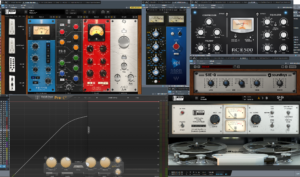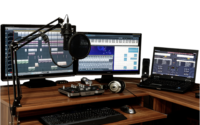The Way You Think About Plugin Presets Is Broken (And How To Fix It)
 I mentioned in last week’s article that I have a love-hate relationship with plugin presets. There are times they can really help me out, and others when they’re the worst thing about DAW mixing. Let’s break that down a bit and talk about the good, the bad, and the ugly. We’ll start with…
I mentioned in last week’s article that I have a love-hate relationship with plugin presets. There are times they can really help me out, and others when they’re the worst thing about DAW mixing. Let’s break that down a bit and talk about the good, the bad, and the ugly. We’ll start with…
The Ugly
I’m just going to say it: presets can lead to lazy mixing. In the interest of laziness and expediency, it’s so easy to scroll through and find “Big Rock Guitars 2” and “Slamming Drums” and just slap those on your tracks, and call it mixed.
Stop it.
You can’t even call that mixing. You’re not using your ears. Your using someone else’s idea of “big drums” and “rocking guitars.” These might get you something sort of resembling a mix (more on this later), but for crying out loud, please stop relying on these to mix your songs. All you’re going to end up with are songs that all have the same drum sound, the same guitar sound, and no variety or character. Plugin manufacturers don’t know how you recorded your tracks, so they certainly don’t know what’s best for you. Worst of all, you’re not learning how to use any of the tools in an effective manner.
The Bad
If you’re ever going to be effective at mixing music in your studio, you need to learn your tools. This means being able to dial in a sound from scratch.
This will likely take some time – both to learn how to use the plugins you have, and to learn who to use those tools to get the sounds you hear in your head.
Keep mixing, keep making music, and over time, you’ll start to develop an ear for things. You’ll hear a bass track, and intuitively know what it needs.
That, my friends, feels powerful. Whenever that happens to me, I feel like an absolute ninja. I start mixing intuitively and know exactly (or even roughly) how to get the sound I’m after. Keep working at it, find some tutorials (either here, Youtube, or other websites), and get learning. You’ll be a lot more effective than if you’re just cycling through presets and hoping one of them sounds good. It’s much better to know how to turn knobs to make it sound good yourself.
The Good
Okay, it’s not all bad.
Personally, I despise factory presets on EQs and compressors.
However, presets can absolutely come in handy when you get a new tool that does some crazy things to your audio. Saturation plugins, weird vibey echo units, wideners and doublers… anything that can make my audio go absolutely bonkers, I like to cycle through and see what the unit is capable of. And that’s where presets can help: figuring out the extremes of what a piece of software can do.
For one, I might stumble on a sound that may not work in the acoustic folk track I’m working on at the moment, but I’ve got a psychedelic rock mix next week that would absolutely benefit from that sound.
For two, I can find a preset that gives me 80% of what I’m looking for, and start tweaking knobs to hone in the settings. As an example, I know I tend to like an 1176-style compressor on vocals, with a slow release (still fast, thanks 1176), and fast attack to grab it and hold it in place. Why not have a preset for that, and just adjust the input and output (or the threshold for any other compressor) to taste, and tweak anything that needs it? You could almost call it a partial preset – it gets me in the ballpark, and I do the rest. Make no mistake, though – if that particular preset isn’t working for me, whether it’s an individual plugin or a chain of them, I’ll abandon it altogether, and attack the problem from another angle entirely.
Are You (Ab)Using Presets?
A lot of my mixing workflow is dragging plugins over with their default settings and going from there, but I’ve not always mixed that way. When I was starting, I relied heavily on presets – especially if I stumbled into something that I thought sounded good – I’d save that preset, and use only that sound, deciding, “This is how all of my snare drums are going to sound forever.”
It doesn’t work that way. I urge you to evaluate your use of plugin presets. You may find they’re a bit of a crutch, to which I challenge you: start learning your tools, instead of learning the presets.
Happy music making!







